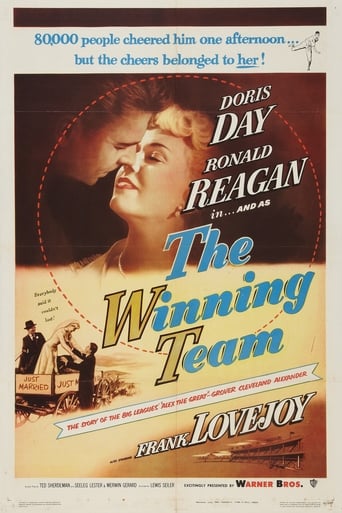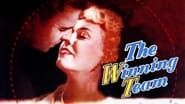MartinHafer
When film began, Grover Cleveland Alexander was a teenager--while Ronald Reagan was almost 40! singing?! This is a biopic about the career of one of the greatest pitchers in major league history, Grover Cleveland Alexander. If you look at the man's statistics, they are staggeringly impressive. Because of this and Alexander's later medical issues, it's not at all surprising they made this film. What is rather surprising, however, is that they chose Ronald Reagan to play the man. When the film began, he was supposed to be a very young man--while Reagan was nearly 40! He did fine in the role, however.The first half of the film sticks reasonably close to the facts. If anything, it underplayed the greatness of the man (such as not even mentioning his three consecutive 30 win seasons and winning the triple-crown three times). However, around the middle of the film, the story gets hokey--and deviates very far from the truth. While Alexander did have problems with epilepsy and alcohol following his stint in WWI, the film made it look like his life and career fell apart. It also shows him being out of major league ball for some time until he cleaned himself up--but this just isn't true. He never had a losing season and still had excellent statistics until his final season in ball (when he was 43)--and the lengthy downward spiral in the film just never happened. With a career record of 373 and 208, he clearly was no bum! Overall, "The Winning Team" is a highly enjoyable and highly inaccurate and sensationalized film. While I do recommend it (it's well made and interesting), it seems sad that a great man's life was so distorted just to see a few extra tickets. But, that was pretty common for Hollywood during this era.
Robert J. Maxwell
The Platonic ideal of a 1950s biographical movie. Hardly a word or a scene is believable. It's so stilted and unimaginative that I rooted for it to win.When I was a kid the theaters were filled with nonsense like this, colorful life stories of extremely famous celebrities nobody ever heard of, and gaudy musicals with songs from the Old Stone Age, all from the teens and 1920s. It wasn't until some years had passed that I realized that, for most of the audience, these people, events, and songs were still alive in their memories, no farther behind them than the Beatles are behind us.Grover Cleveland Alexander, a Nebraska farm boy (Reagan), is a natural pitcher who is discovered by a minor league team and plays ball for them during the summer. The problem is that his girl friend (Day) doesn't want him to be a baseball player. She wants to settle down with him on a nice farm with a picket fence and a rose garden and build a stable home. Already the movie has left originality behind on a distant horizon, hidden in a cloud of stirred-up Nebraska loess, and it's only fifteen minutes into the story.But never mind. Day moons over the conundrum for a while longer and then decides to marry him anyway, after he's offered a contract with a major league team in Philadelphia.Alexander is a success in 1911. He's a great pitcher. We know this because there is a montage of Ronald Reagan winding up, throwing a ball past the camera, and leaning into it with a big grin. There is also a montage of a proud and smiling Doris Day pasting newspaper clippings, bespeaking triumph, into a huge scrap book labeled in gilt "Grover Cleveland Alexander".Little did they know that tragedy lay just around the corner. Somewhere along this time line -- I forget exactly where in Alex's dazzling rise to fame -- he gets clipped by a bean ball and is knocked out. He wakes up with diplopia -- seeing two of everything. Now, this is unwelcome news for a famous baseball pitcher, and Alex retires to the farm for a year, unreconciled to his disorder -- partly because he's convinced he can still PITCH if only it weren't for his eyes, and partly because he can't spell diplopia.Then -- a miracle! He wakes up at night, goes to shut the window, and he sees only ONE MOON! And before you know it he's back in the game. However, tragedy lies just around the corner. No, no, the diplopia is gone for good. This is a different tragedy.It's 1918 and World War I is upon us. Alex is drafted and is an artillery sergeant. The constant booming of the cannons makes him a little hard of hearing but, worse than that, he begins to get dizzy spells. After a triumphant return from the war, a dizzy spell causes him to pass out on the mound. The spells return. Alex sees a doctor in secret who tells him gravely that "science doesn't know much about these things." He is SO right, because doctors are not screenwriters. Writers know all the details of mysterious illnesses -- what the symptoms are, when they should appear and when they should go away. Based on Alex's description of the symptoms, my Dx is temporal lobe epilepsy. That will be ten cents.The mysterious dizzy spells cause him to start drinking and he winds up a bum in some shabby carnival as so many heroes of these biopics must -- Joel McRae in "Buffalo Bill", Tyrone Power in "Nightmare Alley." He's rescued by an offer to return to the majors by an old friend, with the complicity of Doris Day, and a gigantic hole appears in whatever logic the plot holds. His dizzy spells disappear on the pitcher's mound, as long as he can look into the stands and catch the refulgent splendor of Doris Day's big white grin. At the very end, at the most critical moment, with the Yankees at bat and the bases loaded and the count three and two, Day is delayed in reaching Yankee Stadium, and Alex looks worried and sweaty, and the shapes begin to waver and shift, and -- and -- I had to close my eyes because I couldn't stand the tension so I can't tell you what happened.I applaud this movie because instead of just one tragedy -- either the double vision or the dizzy spells -- you get two. This ratchets up the suspense to the Red Alert level. Also, Doris Day is mighty saucy.Don't miss this if you want to see a typical biographical flick from the 1950s. Definitely see it if you want to know why "they don't make 'em like this anymore" and feel happy that they don't.
JLRMovieReviews
You don't have to be a baseball or a sports fan to enjoy this film about Grover Cleveland Alexander, one of baseball's great figures in history. Ronald Reagen and Doris Day star in this entertaining and fast moving film that describes Alexander's life before stardom, his own personal demons, and eventual comeback into the world of one of America's most beloved pastimes. Even though some have said, it's not totally accurate in the facts, the movie reflects Alexander's love of the sport, and the movie "The Winning Team" is a testament to Ronald and Doris that we feel we're seeing the real thing. While this film has remained virtually unknown, it has come out on a Ronald Reagen DVD set and deserves to be seen by those who appreciate old movies and who love biographies of any kind.
ccthemovieman-1
Grover Cleveland Alexander was a remarkable pitcher and lived a very interesting life in an era in which baseball sported the most colorful people in its history: the early 1900s. Some of stories about them, like this one, are very inspiring, too, although they end this bio on Alexander's high note not his tragic demise - but what's wrong with that? People want to leave the theater feeling good, not depressed.Ronald Reagan does a decent job portraying "Alex," except for the baseball scenes where he doesn't throw or hit like a real big-leaguer. That was common in classic sports films. You don't see that now. Robert Redford ("The Natural"), Kevin Costner (several baseball films) and the like, know how to play the game.This is corny in spots and it's sugar-coated like some of the other classic sports stories. However, Alexander is shown with his drinking problem and his wife, played by Doris Day, also does the wrong thing walking away from her husband in his time of need.....so you do see some bad with the good. Yet, all ends well and overall, it's an interesting movie.What's more, the climactic scene actually happened in real life where Alexander turned into a World Series hero despite the odds against him. If you really want interesting stories, read the real-life accounts of men like Alexander, Ty Cobb, Babe Ruth, Christy Matthewson, John MacGraw, Honus Wagner, Tris Speaker, etc. They are fascinating.




